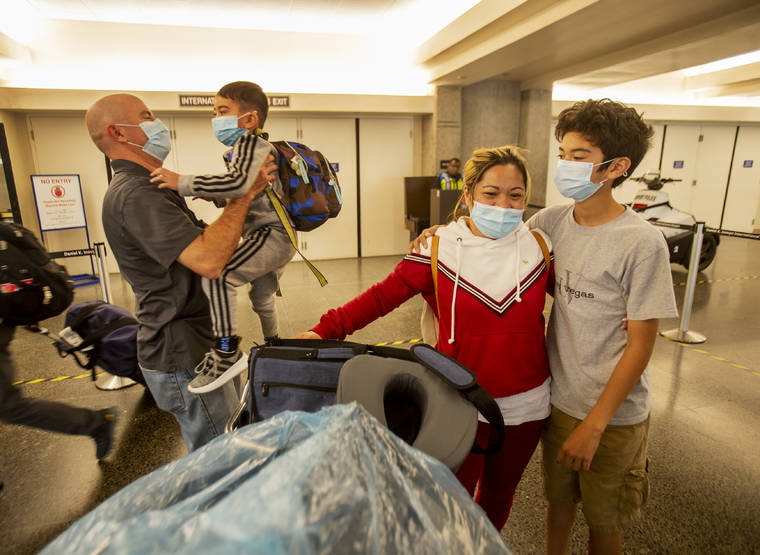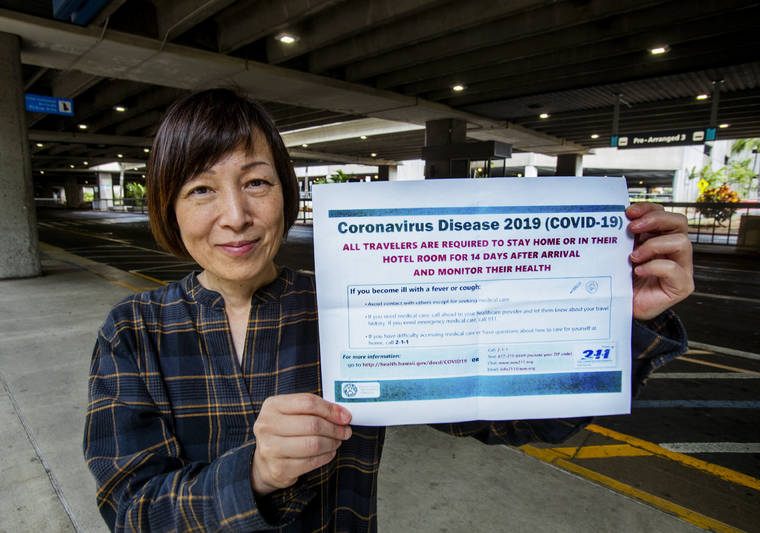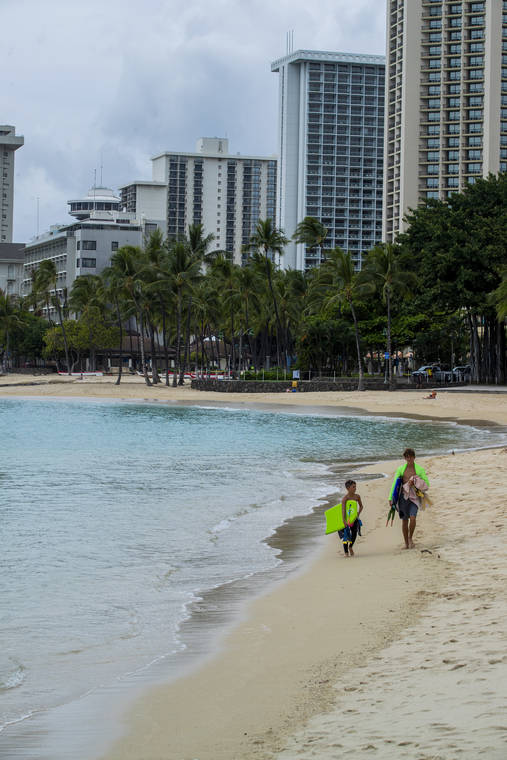Arriving passengers face 14 days of mandatory self-isolation, based on the honor system


DENNIS ODA / DODA@STARADVERTISER.COM
Daniel K. Inouye International Airport is nearly empty as most flights have been canceled. From left, Daniel Gillum on Thursday greeted his son Eli, 3, who just returned from Japan along with his mother, Gina Gillum, who was greeted by their son Gabriel, 13, who was with his father in Honolulu.

DENNIS ODA / DODA@STARADVERTISER.COM
Miwako Yamamoto, who was returning from Japan to Honolulu, where she is a massage therapist, displayed a form handed out Thursday by Hawaiian Airlines.

DENNIS ODA / DODA@STARADVERTISER.COM
There was a lack of tourists Thursday on the streets and beaches of Waikiki.




On the first day of Hawaii’s mandatory 14-day quarantine, travelers trickled out of Daniel K. Inouye International Airport and some flew into the arms of their loved ones.
Gov. David Ige’s order mandates that arriving passengers — visitors and residents — take social distancing to the extreme. But that’s not going to stop a daughter from hugging her mother after being separated for months.
Makakilo resident Moana Piena waited outside for her daughter, Mahina, to return from a 14-month missionary trip in Japan. Piena held a sign written in Japanese that read, “Welcome home Sister Piena.” When the 21-year-old daughter saw her mom with that sign, she couldn’t resist a long embrace.
It’s clear that the penalty for breaking the quarantine is a fine of $5,000, up to a year in jail or both. It’s also certain that the main purpose of the order was to discourage visitors from coming to Hawaii and locals from traveling to help flatten the curve of rising COVID-19 across the state. Opens in a new tab
Beyond that the order gets a little murky, especially on the enforcement side.
>> PHOTOS: Travelers arrive to an empty airport in Honolulu Opens in a new tab
Don't miss out on what's happening!
Stay in touch with breaking news, as it happens, conveniently in your email inbox. It's FREE!
Upon deplaning, passengers’ identifications are checked to make sure they match the information they listed on a state Department of Agriculture declaration form. They are handed a self-quarantine order advising them to go directly to their homes or lodging. They are told they must stay in isolation unless they need urgent medical assistance. The back of the order provides information on how to monitor their health and what to do if they become sick.
There are more than a few loopholes. The state wants visitors to hole up in their hotel rooms or vacation rentals ordering in food and all the essentials, but they are allowed to take a taxi or other forms of public transportation to get there.
The Hawaii Tourism Authority has assigned a contractor to collect information at the airports and let hotels know if a guest is heading their way.
“Random phone calls can be made to the hotel to ensure that that person is in fact in that hotel room and to ensure that they are in fact quarantined,” said state Department of Transportation spokesman Tim Sakahara.
Still, Keith Vieira, principal of KV & Associates, Hospitality Consulting, said after a guest checks in, the quarantine is mostly on the honor system. Hotels could struggle to distinguish the guests who checked in Thursday under a quarantine order from those who were there Wednesday and aren’t subject to the same restrictions, he said.
“Hotels aren’t in the enforcement business. They aren’t going to police it,” Vieira said.
Following up is perhaps even more challenging for vacation rentals, which often don’t have staff on the premises, Vieira said.
Mufi Hannemann, president and CEO of the Hawaii Lodging & Tourism Association, said he contacted Airbnb to ensure that they and other vacation rental operators plan to abide by the same rules as Hawaii’s hotels.
“This is serious. This is not fake law. This is the real deal and we are taking it seriously,” Hannemann said.
Hotels that have a problem with a quarantined guest not complying are supposed to contact police, he said.
Hannemann noted a more visible police presence in Waikiki for Thursday’s quarantine, which went smoothly, from what he’s heard. A major reason is that there just weren’t that many tourists checking in.
A typically crowded Waikiki Beach was nearly empty Thursday, March 26, due to the statewide lockdown order amid the coronavirus pandemic.
“On Oahu, only 14% of the 500-plus folks that came today were so-called visitors,” Hannemann said.
To be sure, the airport looked like a scene from a post-apocalyptic film — hardly anyone was there Thursday morning, and some of them wanted desperately to leave.
Owen Schriber, 21, arrived from Japan and was hoping to catch a 2 p.m. flight to Los Angeles so that he could eventually make his way home to Rhode Island after backpacking across Asia.
“I was going to be in Vietnam until June, but I now had to scramble to get home. It’s been frustrating and stressful the past couple days. I got lucky by finding this flight, but all of the tickets for international flights skyrocketed and there’s no way to get home without spending, like, $2,200,” Schriber said. “Domestic travel in the U.S. is really cheap, but international is a mess because everybody is trying to get home.”
Schriber noted a recent rush of returning travelers but said that he encountered few tourists during the two months that he spent in Cambodia and Vietnam.
“It was dead in a lot of the really nice tourists areas. I’m probably never going to see it like that again,” he said.
That was certainly true of Honolulu, where Sakahara said multiple flights arrived Thursday with no passengers or only one passenger, and many came in with fewer than 10 people.
“You can see that the measures that have been put in place have been working. People are not coming into the airports, and visitors are canceling their trips or staying home,” Sakahara said.
On Tuesday, Oahu’s arriving North American passengers had fallen to 2,430 from more than 13,500 on the same day last year. Only 38 people flew into Kauai’s airport Tuesday compared with more than 2,500 on the same day last year.
While the drop in North American passengers has been significant, the 14-day quarantine rule does not apply to interisland flights.
Kauai Mayor Derek Kawakami said Thursday on his daily Facebook post that he asked Gov. David Ige to extend the 14-day quarantine to all interisland travel.
Kauai had five confirmed coronavirus cases as of Thursday, while Oahu had 77.
Hawaii state Sen. Glenn Wakai, chairman of the Senate Energy, Economic Development and Tourism Committee, said he’s heartened that some visitors are staying away from Hawaii. However, he’s concerned that even a few are coming and that the current quarantine order falls short of ensuring their compliance.
“We could wish all we want that people are complying and responsible, but it’s really up to them and their personal morals to abide by what’s good for the greater society,” Wakai said. “We need to put some thought into the enforcement element as people continue to come in and disregard the government’s request.”
It’s not so easy to bring local families, especially those that live in tight spaces or large households, into compliance, either. It’s a tall order even for those like Piena, who plan to obey.
On Thursday, Piena still was trying to sort out the logistics of quarantining her daughter, Mahina, in a small house full of eight people.
She said her in-laws might house Mahina, along with a cousin coming in from another country. But they already have six people living in a compact space.
“I’m a little worried because our homes are smaller,” she said. “They really can’t isolate them just because of the lack of space.”
Kailua resident Andy Maras bought a two- bedroom house in Kaaawa so his daughter, Kiegen Maras, who was on the same missionary trip to Japan as Mahina Piena, had space to quarantine alone.
“She has four siblings,” he said. “I think my little boys … they don’t know how to stay away. They’ll be all over her, and it would be too hard to be that close and not be able to hug her.”
Honolulu resident Daniel Gillum said Thursday that his eight-member household would voluntarily quarantine after his wife, younger son and grandmother arrived from the Philippines.
“When the COVID-19 issue started to affect travel plans, and with the possibility of them getting stuck there, we decided to bring them back as soon as possible,” Gillum said.
Gillum said his family is well aware of the 14-day quarantine and is prepared to tackle it.
“We have plenty of food and water,” he said. “Provided that we have no symptoms and clean health, then we’ll continue with the everyday precautions, good practices, social distancing, and we’ll go on about our lives.”



